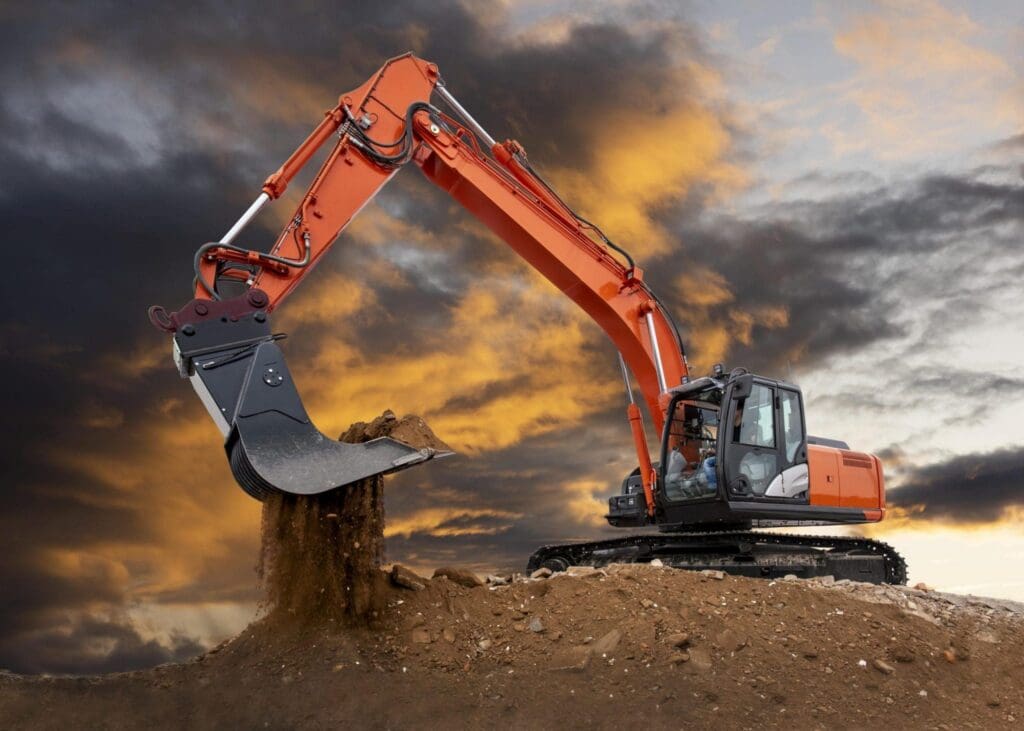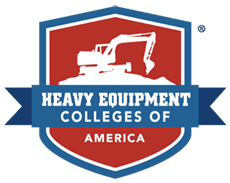Are you ready to become an excavator operator? The first step is to find an accredited heavy equipment school—like Heavy Equipment Colleges of America (HEC)—and enroll in a training program. Our program will equip you with the knowledge and skills you need to land the job you want. Keep reading to learn everything you need to know about excavator operation.
Table of Contents
What is an excavator?
An excavator is a piece of heavy equipment that is used to dig holes in sand, earth, and rock and load materials onto conveyors or trucks for removal. It consists of a boom dipper, a bucket, and a cab that sits on a rotating platform known as the “house.” Its undercarriage may be on tracks or wheels. In a nutshell, an excavator is a mechanical shovel that is used for:
- Digging holes and trenches
- Moving materials
- Demolition
- Grading
- Landscaping
- Mining (underground and surface)
- Dredging rivers
- Removing snow
What Is an Excavator Certification?
An excavator certification simply shows employers that you know how to operate excavation equipment safely and efficiently. It’s a credential that you can—and should—add to your resume when applying for jobs.
Top 4 Benefits of Earning an Excavator Certification
1. Improve Your Safety
Excavator certification courses teach you how to operate an excavator safely to protect you, fellow workers, and bystanders from harm. Here are a few of the safety skills you’ll develop.
- Identify hazards
- Remove obstacles
- Use proper hand signals
- Perform routine maintenance
2. Learn to Inspect
You should always inspect the excavator thoroughly before using it to identify and address any hazards that could put you in danger. Excavator certification training will teach you how to perform routine inspections and fix common problems.
3. Refine Your Skills
An excavator certification program will help you refine your existing skills and help you develop new ones that will serve you well on the job.
4. Enhance Your Resume
Employers want to hire skilled professionals who have adequate training and hands-on experience. Earning your excavator certification shows potential employers that you have what it takes to do the job right.
Is It Difficult to Operate an Excavator?
As long as you’re properly trained and pay careful attention to what you’re doing, it isn’t hard to operate an excavator. However, like anything else, it takes practice to do a good job.

How to Operate an Excavator
Check out our five-step guide to excavator operation.
- Climb onto the excavator safely
- Secure your seatbelt, and turn on the machine
- Use the joysticks on the right-hand side to move the boom up and down, open and close the bucket, move the excavator stick in and out, swing the cab
- Use the pedals to move the machine forward
- Lower the blade to restabilize the machine
What Tasks Does an Excavator Operator Perform?
It’s important to set proper expectations before enrolling in an excavator operating training program or applying for a job. Part of setting your expectations involves knowing what skills you will acquire and be expected to have. Here are some key skills you need to become an excavator operator.
- Drive the excavator between locations on the job site
- Clear and transport dirt, rock, and other materials
- Excavate the ground
- Inspect equipment regularly
Do You Need a License to Operate an Excavator?
You need a valid driver’s license to operate an excavator. Although you don’t need a special excavator license, most employers prefer that you are trained and certified.
The Skills Required to Become an Excavator Operator
Employers look for candidates with the following skills:
- Attention to detail
- Spatial awareness
- Demolition skills
- Trenching skills
- Hand-eye coordination
- Physical strength
- Ability to work well under pressure
How Can I Become an Excavator Operator?
1. Explore Excavator Operator Education Requirements
After earning your high school diploma or GED, you can apply to a certified excavator training program. Upon completing this program, you can earn your official excavator certification. Once you’re certified, you can apply for excavator operator job openings.
2. Develop Specific Excavator Operator Skills
From spatial awareness and trenching skills to hand-eye coordination and physical strength, you need particular skills to become an excavator operator.
3. Complete Relevant Excavator Operator Training and Internships
All HEC program participants have access to job placement assistance offered by our career services team. If you want help landing your dream job, we’re here to help.
4. Prepare Your Resume
Any excavator operator job will require you to submit a resume. Your resume should outline your skills, experience, and qualifications for the job. Our career services team also provides expert resume-building services.
What Are the Other Requirements to Become an Excavator Operator?
Excavator operators must:
- Be at least 18 years old
- Have a high school diploma or GED
- Be in good physical condition
- Have good vision
- Have a valid driver’s license
- Have adequate mechanical aptitude
How Much Does an Excavator Operator Make Annually?
The annual median wage for excavating and loading machine and dragline operators in the United States in 2022 was $48,350.
How Long Does It Take To Learn to Operate an Excavator?
You can learn to operate an excavator in three weeks at an excavator school like HEC. You’ll get to practice on excavators and other equipment like backhoes, skid steers, and wheel loaders. Enroll in the Certificate of Heavy Equipment Operations – Level II course (also three weeks), and you can build on the skills you learned in Level I. You’ll learn to operate a bulldozer as well as a hydraulic excavator.
How Do I Get Certified to Operate Heavy Equipment?
Attending a school like Heavy Equipment Colleges of America can give you hands-on training and the heavy machinery license employers across the country value.
After you complete Level I of your training program at HEC, you’ll be qualified to take the ADEPT (Adaptable Equipment Proficiency Testing) exam, a nationally recognized heavy equipment operations certification valued by employers. You’ll have earned a Certificate of Heavy Equipment Operations and will get your operator’s card (license).
What Is the Job Outlook for Excavator Operators?
O*NET OnLine reports that the projected job growth for excavator operators in the United States through 2028 is 7-10 percent, which is faster than the average for other jobs. Would you like to become an excavator operator? Contact HEC to get the training you need to succeed.
*Located on a military base and eligible to veterans only through the Career Skills Program (CSP). VA Education Benefits can be used in Washington.
Where Can I Find Excavator Training Near Me?
HEC offers programs in several locations throughout the United States:
1. CA – San Bernardino: 1955 W. 9th Street | San Bernardino, CA 92411
2. Georgia: 3120 Stonecrest Blvd, Suite 220 | Stonecrest, GA 30038
3. Oklahoma: 6101 W. Reno Avenue, Suite 1000 | Oklahoma City, OK 73127
4. Washington: 4701 McChord Drive SW | Lakewood, WA 98499
*Location is Veteran Only – DoD SkillBridge and VA Education Benefits

